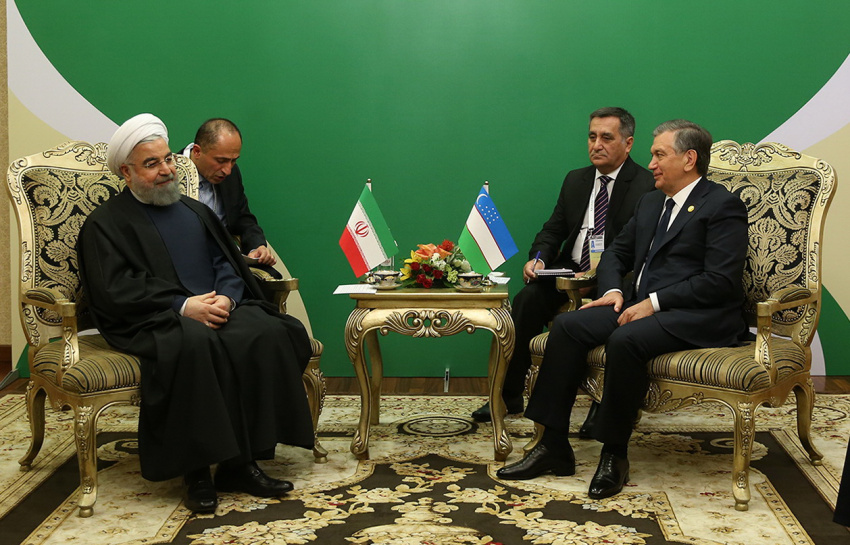Iran-Uzbekistan Relations: Problems and possible solutions

Iran and Uzbekistan are the most significant states in the Middle East and Central Asia, whose potential can influence much the development of the present-day hotspots (like Syria and Afghanistan) in the world and, hence, the forming new international system. Peace, stability and predictability of their relationships can contribute stability and peace in the wider Middle East, Central and South Asian regions due to their geographical, historical, religious and cultural proximity, economic and human resources. And, on the opposite, absence of close cooperation and coordination of efforts between Uzbekistan and Iran preserve, as the time has proved, regional conflicts (Afghanistan) and contribute to the economic and social backwardness of the vast region, including their own territories. It is especially important too that in the presently changing globalized world this can also endanger their common cultural-civilization identities, religious values and traditions.
For the last three decades, unfortunately, Iran and Uzbekistan had extremely low level of cooperation, mostly at the civil society level (shuttle trade, few civilian and academic contacts). It is time to solve this problem as the ongoing geopolitical tension and social-economic instability in these regions, unsettled international issues will only be exacerbated in the circumstances of the regional fragmentation. It can also challenge realization of the future mega-transport corridors like Chabahar, North-South, etc.
What kind of barriers and obstacles hamper the bilateral relations? They can be divided into internal and external ones.
At the internal level:
- Secular regime in Uzbekistan versus religious regime in Iran. Uzbekistan has atheistic past from the Soviet Union that influenced much its mentality and way of life. Although Uzbek population is increasingly turning to the fundamentals of Islam and make pilgrimage, it is mostly secular minded: even being in hijab, Uzbek women and girls prefer to study, make business, and go abroad, there is not neither official nor home obstacles for that.
- Stereotypes and fears of Islamic radicalism and extremism from the territory of Iran in Uzbekistan. This impedes correct decision-making regarding Iran and behavior of ordinary people not wishing to have any problems on this issue.
- Transitional difficulties:
- weakness of institutions and legislation, as well as brain drain in both countries – this predetermined weak executive power not able rapidly and efficiently solve the arising problems, including the work with foreign guests and colleagues, cooperation in international projects, developing all kinds of business.
- Uzbekistan and Iran have now shortage of highly qualified cadres able to work in the globalized environment. There are not many people in Uzbekistan with sufficient knowledge of English or Farsi, and very few people knowing Uzbek in Iran, that altogether restrict contacts between the countries.
- Both states need investments, high technology, and know-how to push ahead big projects.
- Absence or shortage of necessary infrastructure and logistics in both countries to successfully develop mutual business.
- Poverty. Very few in Uzbekistan and Iran who can afford themselves travelling abroad. In Uzbekistan there are mainly labor migrants that travel to earn money in some countries (that cover their expenditures). This is not the case for Iranians restricted by their own laws and international sanctions.
At the external level:
- American sanctions against Iran, not allowing to make huge investments into the big scale projects with Iran.
- Geopolitical competition between great and regional powers (US-Russia, US-China, Iran-Turkey), which restrict some possibilities in the bilateral relations and forces Uzbekistan and Iran to act with caution to somehow balance international relations.
- Instability in Afghanistan, which narrows possibilities of economic cooperation and creates security problems.
In conclusion
It seems nowadays differences of regimes have no such great importance as Iranians have long history of living among the Western people (under Great Britain and the US) and are still having constant ties with them within various academic and educational programs in the West. This made most of Iranians more moderate and even westernized that can contribute to mutual understanding between Uzbekistan and Iran.
Joint efforts and collaboration in different spheres (business, academic, civil society institutions, etc.), including among the law-enforcement agencies, would contribute to gradual disappearing of stereotypes and fears of Islamic radicalism and to gradual solution of the transitional difficulties. To speed up this process it would be expedient to
- establish mutual contacts and start cooperation with various governmental and non-governmental agencies and departments to share experience and knowledge, consult or train, etc.;
- special attention should be made at exchange of experience in technology and know-how spheres, conducting social-economic reforms, etc. This can contribute to achieving regional self-sufficiency and well-being.
- Organize language courses (Uzbek for Iranians and Farsi for Uzbekistani), conferences, forums and seminars, lectures and videoclasses – both online and traveling, when possible, to the country.
- Strengthen scientific cooperation – mutual research and projects in the fields like archival investigations, archeology and culture, restoration works, publication of joint books and articles, etc.
At the external level it would be desirable for both sides to
- coordinate some foreign policy steps aimed at achieving some balance of interests and forces in the region;
- provide mutually complementary security and economic policy regarding Afghanistan;
ensure secure realization and work of the planned transport and energy projects.

